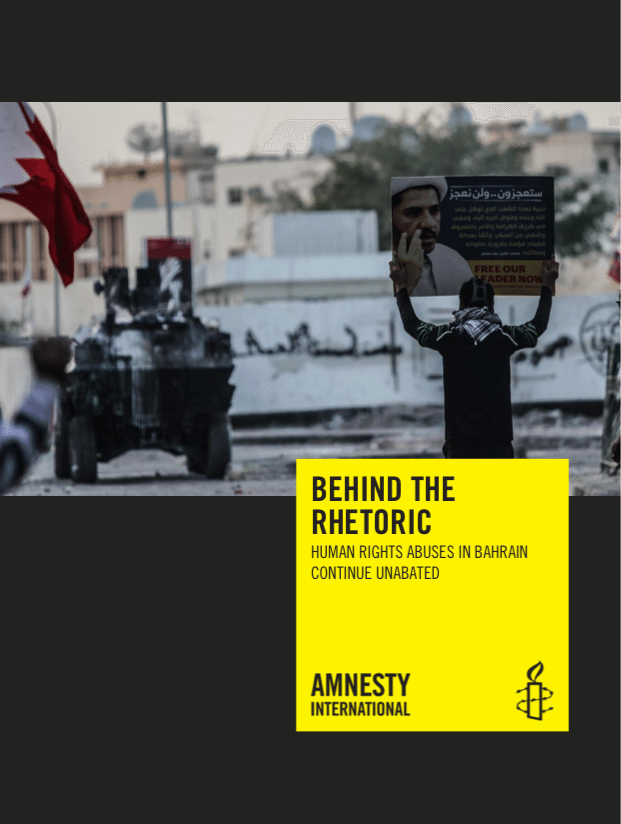A new report by Amnesty International details the rampant abuses including torture, arbitrary detentions and excessive use of force against peaceful activists and government critics, which continue to take place in Bahrain four years after the uprisings that rocked the Gulf kingdom in 2011.
Behind the Rhetoric: Human Rights Abuses in Bahrain Continue Unabated, demonstrates that the authorities have failed to deliver crucial reforms to end repression, despite repeated assurances to their Western allies that they are truly committed to human rights. The report is being published days before the world gathers in Bahrain for the Formula One Grand Prix tournament this weekend.
In recent years, authorities have continued to assert their power through a chilling crackdown on dissent. Peaceful activists and government critics continue to be rounded up and jailed across the country.
All public demonstrations in the capital Manama, have been banned for nearly two years. Protests occurring outside the capital are regularly dispersed by security forces often firing tear gas and birdshot pellets, resulting in cases of serious injuries or death.
A 17-year-old boy told Amnesty International how he was struck on the right side of his face by a tear gas canister which tore his flesh and broke his jaw while he was chased by security forces as they dispersed a procession he had joined in December 2014. He said the officer who arrested him placed his foot on his head and said: “I will kill you today.”
The officers who then took him to hospital mocked him and left him screaming with pain for around half an hour before he fell unconscious. He was later released without charge only to be re-arrested during a raid by police at a later date.
Other protesters detained described being brutally beaten, tortured, and threatened so as to force them into “confessions.” One said he had been struck with the claw of a hammer on several parts of his body.
Those held in pre-trial detention are also routinely tortured in order to extract “confessions.” The report highlights dozens of cases of detainees brutally beaten, deprived of sleep and adequate food, burnt with cigarettes, sexually assaulted, electrocuted including on the genitals and burnt with an iron. One was raped by having a plastic pipe inserted into his anus.
Despite a series of legal reforms and the creation of new national human rights institutions, based on recommendations of the Bahrain Independent Commission of Inquiry (BICI), a body established to investigate the government’s heavy-handed clampdown on the 2011 protests, most of these measures have had little impact in practice.
In line with BICI’s recommendations, new institutions such as the ombudsman of the Ministry of Interior and the Special Investigation Unit, have been set up for oversight and to investigate human rights violations by the security forces. However, none are sufficiently independent, impartial or transparent. Legal reforms introduced to lift restrictions on freedom of expression, association and assembly have come hand in hand with moves to strengthen and maintain repressive laws.
Activists and political leaders who have been arrested often face broad national security charges such as “inciting hatred against” or “threatening to overthrow” the government. The leader of the main opposition group, al-Wefaq, is standing trial on such charges. Others have been detained under laws prohibiting insults or the disrespect of heads of state, public officials and military or other government institutions, flags and symbols. Prominent activists including Nabeel Rajab and Zainab al-Khawaja are among several people detained or sentenced to prison terms merely for posting comments on Twitter or in one case, reading a poem at a religious festival.
Laws restricting the freedom of political associations have also been introduced enabling the executive authorities to suspend or shut them down, and to take part in their meetings with foreign organization or government representatives.
Despite claims that NGOs can operate freely in Bahrain, the authorities have broad powers to interfere in their affairs. Human rights defenders face routine intimidation and harassment and a draft NGO law threatens to further restrict their freedoms.
Access to the country for international human rights organizations, and foreign journalists has also been tightened in recent years in what appears to be a concerted effort to limit scrutiny of Bahrain’s human rights record.
The authorities have also sought to strengthen anti-terrorism legislation in the face of increasing violence against security forces, and expanded their powers to revoke the nationality of anyone considered to be a government opponent. The failure to deliver on government promises has led to rising tensions within Bahrain with protests, recurring bouts of street violence and an increase in attacks on police officers.
Amnesty International is calling on the international community –in particular the UK, US and EU governments –to pressure Bahrain to improve its human rights record.

